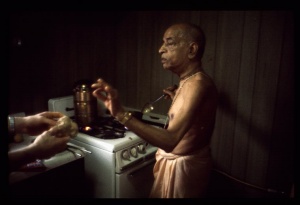SB 1.18.41 (1965)

A.C. Bhaktivedanta Swami Prabhupada
TEXT No. 41
Nisamya saptam atadarham narendram Sa brahmane na atmajam abhyanandat Aho bata amha mahat adya te Kritam Alpiyasi droha urur dama dhritah.
ENGLISH SYNONYMS
Nismaya—after hearing, Saptam—cursed, Atadharham—never to be condemned, Narendram—unto the King the best of the human kind, Sa—that, Brahmanah—Brahmin Rishi, No—not Atamjam—his own son, Abhyanandat—congratulated, Aho—Alas, Bata—distressing, Amha—sins, Mahat—great, Adya—to-day, Te—yourself, Kritam—performed, Alpiyasi—insignificant Drohe—offence, Urur—very great, Dama—punishment, Dhritah—awarded.
TRANSLATION
The father Rishi after hearing from the son that the king was cursed although he is never to be condemned because he is the best of all human beings, did not congratulate his own son but on the contrary began to repent by saying alas what great sinful act was performed by him (his son) as he has had awarded heavy punishment for the insignificant offence.
PURPORT
The king is the best of all human beings, he is the representative of God and he is never to be condemned for any of his action. In other words the king can do no wrong. The king orders for hanging of a culprit son of a Brahmin but for that reason he does not become liable to be sinful on account of killing a Brahmin. Even there is something wrong on the part of a king, the king is never to be condemned as much as a medical practitioner may kill a patient by mistaken treatment but such killer is never condemned to death. And what to speak of a good and pious king like Maharaj Parikshit. In the Vedic way of life the king is trained up to become a Rajarshi or a great saint although a ruling king. Because it is the king only by whose good government the citizens can live peacefully and without any fear. The Rajarshis would manage their kingdom so nicely and piously that the subjects of the king would respect him as if the Lord Himself. That is the instruction of the Vedas. The king is called Narendra or the best amongst the human beings. How then the king like Maharaj Parikshit could be condemned by an inexperienced puffed up son of a Brahmin even though he attained the prowess of a qualified Brahmin.
The Samik Rishi as he was an experienced good Brahmin did not approve of the action of his condemned son. He began to lament therefore for all that his son had done. The king was beyond the jurisdiction of being cursed as a general rule and what to speak of a good king like Maharaj Parikshit. The offence of the king was most insignificant and he was condemned to death was certainly a very great sin on the part of the son of a Brahmin and therefore the Rishi Samik regretted the whole incidence as follows;